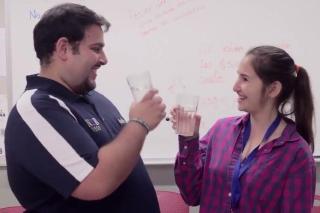Jun 8 2015
The National Nanotechnology Coordination Office (NNCO) is pleased to announce the winners of the first Tiny Science. Big Impacts. Cool Videos. nanotechnology video contest for students. Abelardo Colon and Jennifer Gill from the University of Puerto Rico, Rio Piedras, Nanoscience and Nanotechnology Research Lab won the top honors for their video entitled Chlorination-less.
 The video explains a new method for disinfecting drinking water using a nanodiamond powder. This nanotechnology-enabled method can kill bacteria, is biocompatible, and is reusable, making it a good alternative to traditional chlorination. Credit: Abelardo Colon and Jennifer Gill
The video explains a new method for disinfecting drinking water using a nanodiamond powder. This nanotechnology-enabled method can kill bacteria, is biocompatible, and is reusable, making it a good alternative to traditional chlorination. Credit: Abelardo Colon and Jennifer Gill
The video explains a new method for disinfecting drinking water using a nanodiamond powder. This nanotechnology-enabled method can kill bacteria, is biocompatible, and is reusable, making it a good alternative to traditional chlorination. Congratulations Abelardo and Jennifer!
Videos submitted by students from universities across the United States and U.S. territories, were posted on NanoTube, the official National Nanotechnology Initiative (NNI) YouTube channel, for public voting. The winning video was chosen by representatives from the NNI member agencies from the top two videos identified by public voting. This video will be featured on Nano.gov for the next month. For more information on the Tiny Science. Big Impacts. Cool Videos. contest rules and judges, visit the student video contest page on Nano.gov.
Video by: Abelardo Colon and Jennifer Gill
Advisor: Dr. Rafael Rios
School: University of Puerto Rico, Rio Piedras Campus, Nanoscience and Nanotechnology Research Lab
Abelardo and Jennifer's description: "Access to clean water is a major international issue that must not be ignored. Our research is finding a new method for the disinfection of drinking water. Even so, chlorination is the most common treatment for the disinfection of drinking water, but has a lot of disadvantages. Disinfectant by-products (DBPs) produced by the chlorine disinfection process can cause health problems such as cancer to humans who drink water or inhale vapor. Also some bacteria are able to adapt to this chemical treatment. This is why we are proposing a physical treatment using Ultra Dispersed Diamond (UDD) for the disinfection of drinking water. UDD is a nanodiamond powder, which has bactericidal properties and is biocompatible. After applying the UDD material to the contaminated water we have promising results. There was a reduction of fecal E. coli colonies as time passed and the density of the material increases. This process will be healthier, cheaper, and more environmentally friendly since it is reusable."
This work was supported by a National Science Foundation IGERT grant, Puerto Rico NASA Space Grant and NASA EPSCoR scholarship.